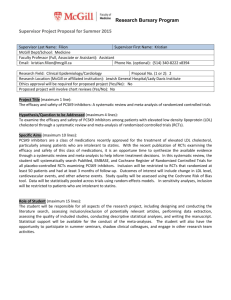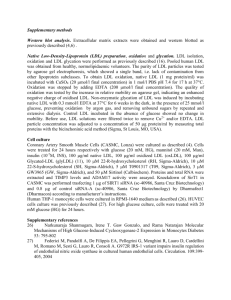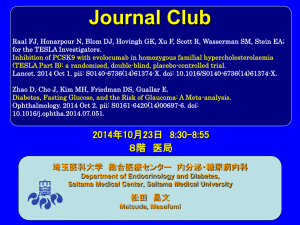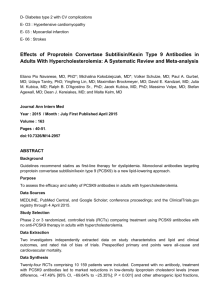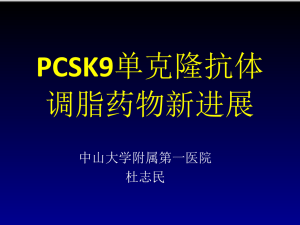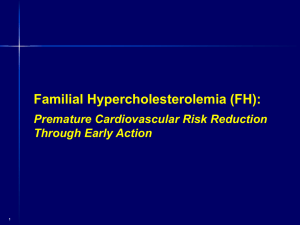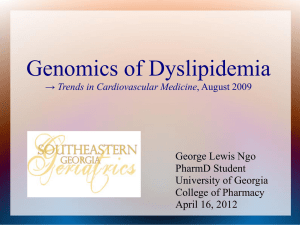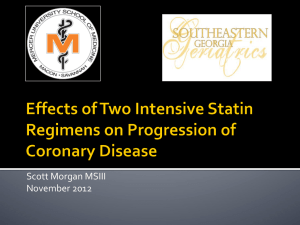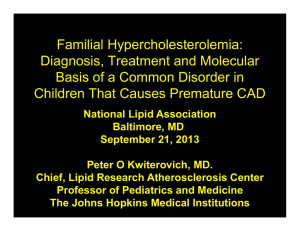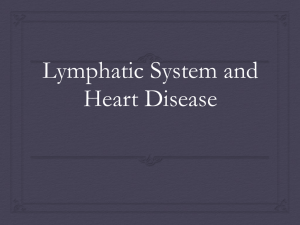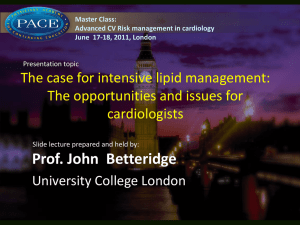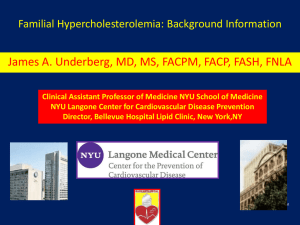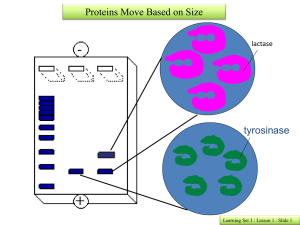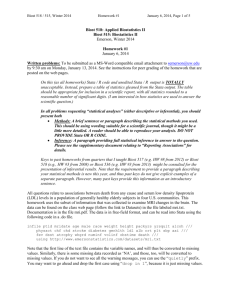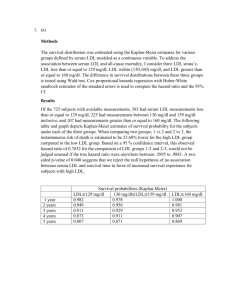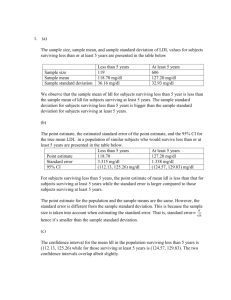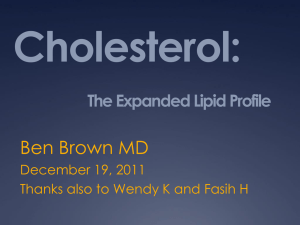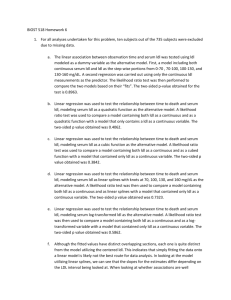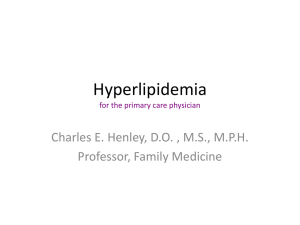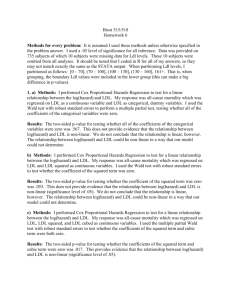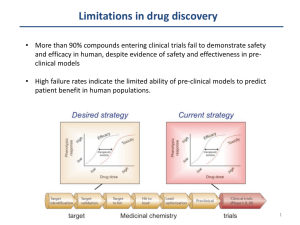Single-Dose Studies
advertisement
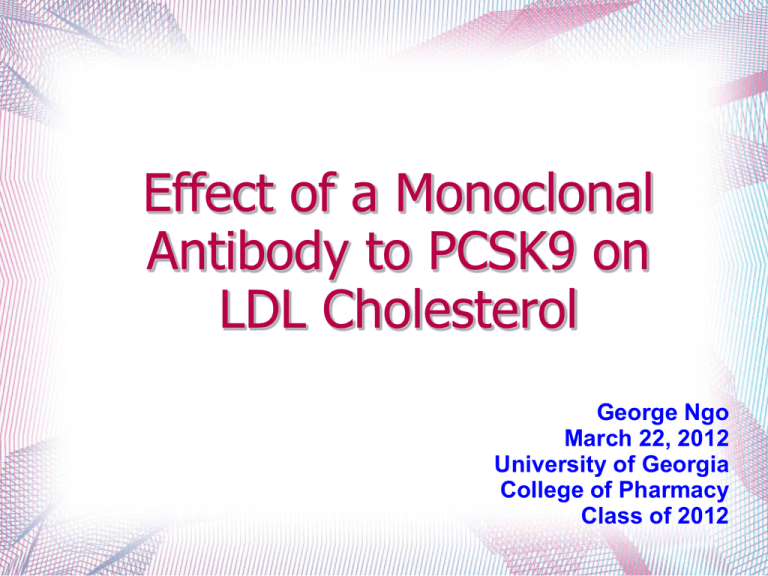
Effect of a Monoclonal Antibody to PCSK9 on LDL Cholesterol George Ngo March 22, 2012 University of Georgia College of Pharmacy Class of 2012 The Basics Monoclonal antibodies bind to a specific epitope (part of an antigen) that the body recognizes The body's immune system recognizes the substance and elicits a response to eliminate it 1) Hepatic LDL receptors → “The Victim” 2) PCSK9 → “The Bad Guy” – An enzyme that binds to hepatic LDL receptors – 1) accelerates their degradation – 2) DECREASES LDL cholesterol intake into liver cells (liver cannot bind and remove LDL cholesterol) – 3) INCREASES LDL cholesterol levels What's Our Hero's Name? 3) REGN727 → “The Hero” – An investigational, fully human monoclonal antibody that is highly specific for human PCSK9 – Blocks PCSK9's interaction with the LDL receptor Primary Endpoint – Occurrence of adverse effects Secondary Endpoint – Effect on lipid profile Single-Dose Studies 40 pts received IV 32 pts received SQ Inclusion Men and women 18-65 years old BMI 18-30 LDL >100mg/dL Prohibited use of other lipid drugs • • IV group • Dose ↑ from 1 → 3 → 6 → 12 mg/kg • Placebo SQ group • Dose ↑ from 50 → 100 → 150 → 250mg • Placebo • Safety assessments: • Vital signs, physical exam, blood tests, EKG Multiple-Dose Studies 51 pts → received atorvastatin with LDL >100mg/dL 10 pts → modified diet only with LDL >130mg/dL – Pts randomly assigned to receive SQ REGN727 (50, 100, or 150 mg) or placebo given on days 1, 29, and 43 • Safety assessments taken: • vital signs • physical examination • blood tests • echocardiography Results: Safety • 2 pts in single-dose studies had ADEs (adverse drug events): – – 33 yr-old w/ abd pain + rectal bleeding on day 83 19 yr-old w/ hx of appendectomy rec'ving 50 mg of SQ REGN727...had small bowel obstruction on day 75 • Lab effects seen: – ↑ total bilirubin (1 pt) – ↑ creatinine kinase (1 pt) • No pts in multipledose studies had serious ADEs • All pts completed all visits • No pt had an ↑ in AST or ALT >3 ULN or ↑ in SCr to > 1.7mg/dL • Headache was the most common ADE Results: LDL Response Single-dose studies ↓ in baseline LDL up to 65% compared to placebo Dose-dependent decrease Higher dose → more decrease Multiple-dose studies Compared with placebo, REGN727 doses w/ atorvastatin ↓ baseline LDL by: 50 mg → ↓ 39.2% 100 mg → ↓ 53.7% 150 mg → ↓ 61.0% Results: Single-dose IV Results: Single-dose SQ Conclusions REGN727 is a monoclonal antibody that blocks PCSK9 from binding to LDL receptors REGN727 significantly reduced LDL cholesterol levels compared to placebo In pts w/ familial or nonfamilial hypercholesterolemia Also significant in pts also taking Lipitor Conclusions MOA: both ↓ LDL by ↑ hepatic LDL receptor activity ***Key difference: Lipitor enhances production of receptors, REGN727 decreases degradation of receptors REGN727 takes 2 weeks for max effect, statins can take longer REGN727 significantly ↓ apolipoprotein B levels Limitations - Small number of subjects - Short duration of exposure - Rates of infection or malignancy as possible ADEs not mentioned - Supported by Regeneron Pharmaceuticals and Sanofi Level of Evidence: IIa-B References Gary D Swergold, et al. "Effect Of A Monoclonal Antibody To PCSK9 On LDL Cholesterol." The New England Journal Of Medicine 366.12 (2012): 11081118. MEDLINE with Full Text. Web. 29 Mar. 2012.
